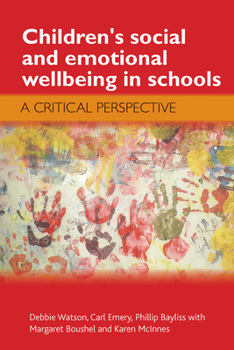Children's Social and Emotional Wellbeing in Schools: A Critical Perspective
Many theories of children's well-being reduce the task of nurturing it to checking items off an objective list. Offering a more complex and nuanced view of the concept, Debbie Watson, Carl Emery, and Phil Bayliss argue here that well-being should be understood at the level of the subjective child and that schools should foster well-being by promoting positive relationships and greater inclusivity. Shedding new light on this critical but often taken-for-granted...
Format:Hardcover
Language:English
ISBN:1847425232
ISBN13:9781847425232
Release Date:February 2012
Publisher:Policy Press
Length:288 Pages
Weight:1.25 lbs.
Dimensions:0.8" x 6.1" x 9.2"
Customer Reviews
0 rating





